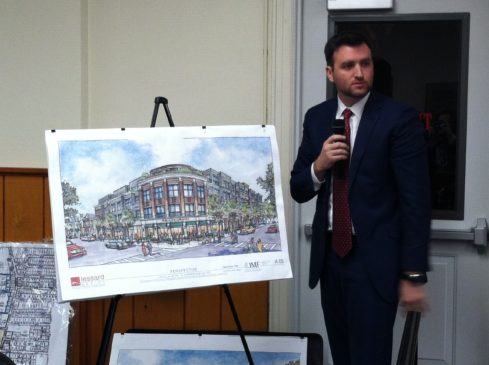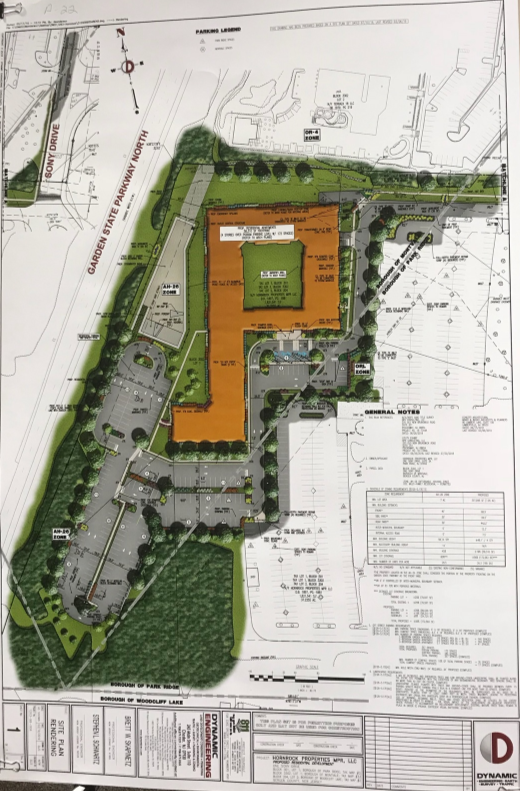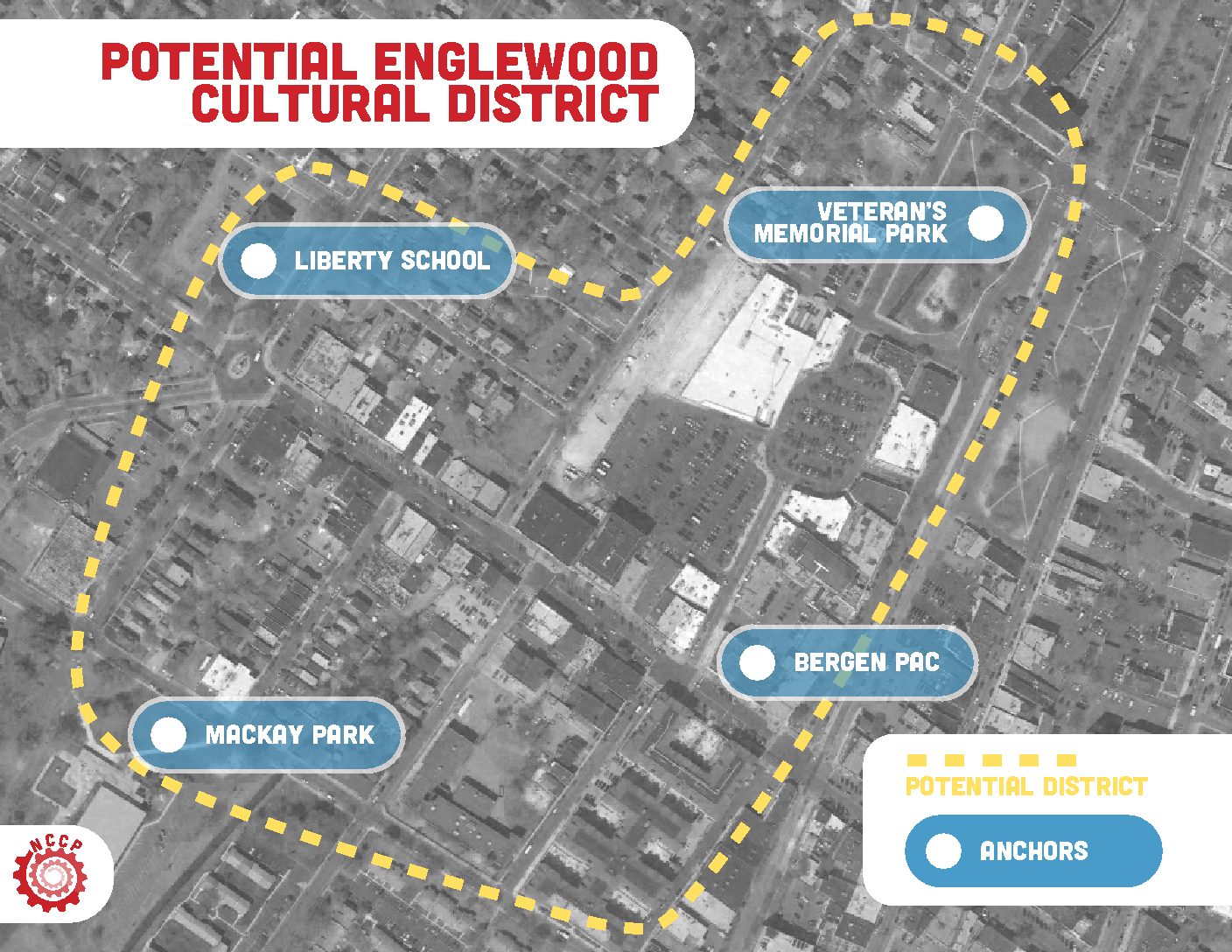
[slideshow_deploy id=’899′]
BY JOHN SNYDER
OF PASCACK PRESS
EMERSON, NEW JERSEY—Over the objections of several residents who spoke—and apparently disregarding arguments by a lawyer representing property owners fighting to stay on their land on Kinderkamack Road—the borough approved an ordinance on Feb. 6 to buy out or push out the owners of four lots in the way of redevelopment.
By a vote of 5–1, with Republican Councilwoman Danielle DiPaola saying no, the council passed an ordinance Feb. 6 authorizing the borough to take four lots via eminent domain should the property owners continue to reject a buyout offer based on market value.
The lots, 2, 3, 4, and 6.01, include the Cinar Turkish Restaurant, Cork & Keg liquor, and Ranch Cleaners, whose owners sued the borough in 2016 over its designation of their parcels as blighted, which facilitates their being condemned and taken.
At stake is an ambitious mixed-use project by JMF Properties to erect retail stores, 147 apartments, and a parking garage on Kinderkamack Road between Lincoln Boulevard and Linwood Avenue, also known as Block 419, with an affordable housing component.

Land Use Board Chairman Gary Schwinder spoke for the ordinance at the meeting, saying in part, “A vote against this ordinance is tantamount to saying ‘do not redevelop’ and issuing a DNR—do not revitalize, do not resuscitate—Block 419 in Emerson. And I think that would be a shame.”
He added, “This is an opportunity to take what we have and make the best of it and get some ratables and have some additional taxes for this town to try and control our future taxes.”
He said, “I know what it’s like being displaced. I had a business in Ridgewood. The building was sold and I was given one month to get out. I found another place to have my office.”
DiPaola told Schwinder, “I think you summed it up when you said ‘take what we have.’ It’s not what we have; it’s landowners’ personal property that’s going to be given up and taken away in order for somebody else to make millions of dollars. I respect what you said but I have to tell you that I disagree.”
The redevelopment is set to feature luxury living and 20,000 square feet of retail for what the property owners’ attorney called “restaurants, luxury goods, fitness studios, and banks” that would net $2.4 million in annual rental income.
There would also be a set-aside of 22 to 29 low- to moderate-income housing units at the site, less than 8 percent of the borough’s unmet need for affordable housing, Richard DeAngelis, a lawyer for the affected property owners said.
DeAngelis said that the borough has been arguing vigorously but erroneously that land taking is applicable because the redevelopment plan was amended to include affordable housing.
“The borough’s affordable housing argument is nothing more than a sham to try and take private property for a redevelopment project (long championed by the mayor) without having to defend against my clients’ legal challenges to the redevelopment designation,” he said.
He told the Pascack Press on Feb. 14 that should Emerson prevail then it would be that much likelier that redevelopers across the state would be able to snap up land for profit through eminent domain ordinance, which authority derives from the legislature and is not intended for this use.
JMF Properties says it has contracts on five of the nine properties it requires to start building.
The affordable housing set-aside is part of a 2017 settlement between the borough and the Fair Share Housing Center and which is before Superior Court Judge Gregg A. Padovano for approval.
DeAngelis provided Pascack Press with a copy of a letter he said he sent the governing body and the borough’s counsel prior to the ordinance vote Feb. 6 that was not brought up at the hearing.
In it, DeAngelis claimed the ordinance was unlawful and premature given its rationale and the litigation in progress, and promised his clients would pursue their remedies to the fullest.
The borough recently moved to quash depositions related to the pending litigation, citing executive privilege, and on Feb. 14 the court notified DeAngelis the borough filed a motion to make his clients a party to its affordable housing litigation as well.
DeAngelis called the ordinance “a sideshow at this point because you have three lawsuits that are pending.”
Overall, he said, “The borough has shown little regard for the rule of law in the past so why should this be any different? It’s just more bully tactics. They’re forging ahead and ultimately this is going to be resolved by the courts.”
What the ordinance says
The ordinance proclaims that the borough should purchase or condemn the properties under the state Local Redevelopment and Housing Law “and/or” the Civil Rights Act of 1968, commonly referred to as the Fair Housing Act.
It further says the takings are “essential as a matter of public necessity, welfare, interest and convenience.”
DeAngelis told Pascack Press that the Local Redevelopment and Housing Law actually prohibits a municipality from acquiring a property by condemnation while a legal challenge to a blight designation is pending.
Moreover, he said, the Fair Housing Act does not authorize the town to take private property and turn it over to a private developer, affordable-housing set-aside notwithstanding.
“Without the tax breaks, which are granted under the redevelopment law, Joe Forgione [President and CEO of JMF Properties] is not building a dog house on Block 419 let alone any affordable housing units,” DeAngelis said.
“So they didn’t cite one enabling statute [in the ordinance]; they cited two. This ‘and/or’ language: again, unprecedented. I’ve never seen that. This is all my firm has done for 50 years,” he said.
[slideshow_deploy id=’899′]
Mayor: ‘It’s a necessary evil’
At a recent breakfast meeting of Pascack Valley mayors, Democratic Mayor Lou Lamatina reported, “Eminent domain is a phrase people don’t like—and frankly we don’t like it as a council—but it’s a necessary evil in our situation to get the project done, number one, but also to comply with our affordable housing obligation.
“Because we’ve moved forward and have done everything pretty much right […] we have a viable plan and that gives us immunity [from certain builder lawsuits] until 2025,” he said.
Residents speak against ordinance
Grand Boulevard resident Lorraine McQueeney said at the council meeting that declaring the target properties blighted and subject to condemnation was an overreach and ignores the value of sweat equity.
She said “some municipal governments have been allowed to get away with whatever they want with impunity” and said the property owners were denied due process.
She agreed with Schwinder that downtown “looks terrible. I’ve been here since 1964; you’re right, sir. It looks awful. But it could be refaced, it doesn’t necessarily have to be demolished and rebuilt at the cost of local merchants who have been here for so many years. Refacing is still a viable alternative.”
She added that “a project of this magnitude should have been put on the ballot. Give the people of Emerson a chance to decide.”
Ken Hoffman, a former councilman who was the Republican candidate in 2017, said the ordinance was unethical and un-American.
“Don’t use the cowardly excuse that you had no choice because you know it’s not true,” he said.
“There’s nothing unavoidable in going forward with this. In your negotiations with the special master there was no mandate to use the downtown redevelopment project to meet affordable housing obligations. You proposed the plan that the special master accepted, not the other way around,” he said.
Moreover, he said, the “supposed necessity” of using eminent domain has become “a self fulfilling prophecy.”
“Your hands are not tied here: You can vote yes and choose the unethical—and frankly un-American—option of taking someone’s private property to give it to someone else. Or you can do the right thing and vote no.”
[slideshow_deploy id=’899′]
Fair Share Housing spokesman says plan is fine
A spokesman for the FSHC, Anthony Campisi, told Pascack Press on Feb. 15 that the redevelopment project, near the train station, is the centerpiece of the town’s plan to meet its affordable housing obligations.
“This development is the most significant part of the settlement that Fair Share Housing Center has reached with Emerson, and it provides much-needed opportunities for low- and moderate-income families to live in Emerson’s downtown,” Campisi said.
He said Emerson has the legal right to proceed with the development, “contrary to the claims of people challenging that decision of the town’s plan to meet its fair housing obligations.”
“It’s really important for towns like Emerson that are in hot real estate markets that are in really expensive parts of the state to comply with the law and build new homes so that millennials, people in service-sector jobs, people just starting out, can afford to live in New Jersey,” he said.



